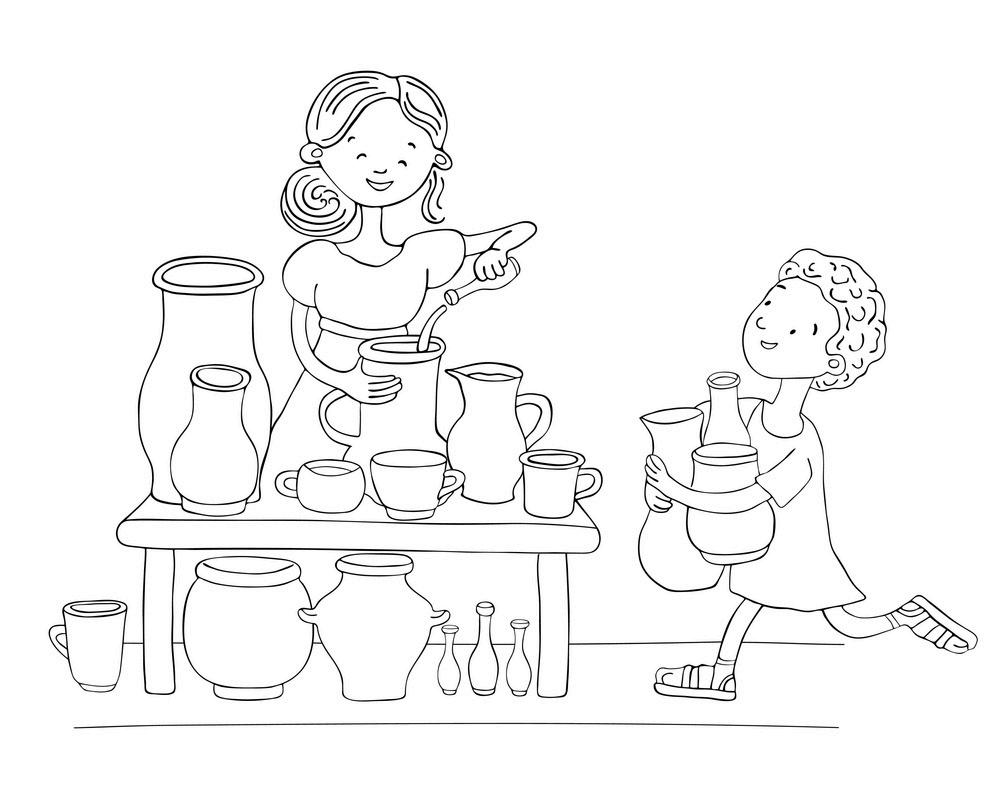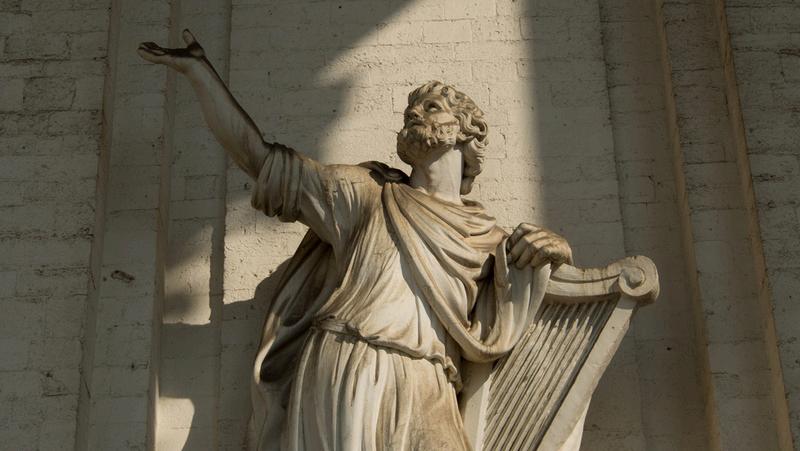The Outtop presents...



KEY VERSES PER MAIN VERSES (HIGHLIGHTED IN BLUE):
A. 2 Kings 4:1; Exodus 21:2; Joshua 3:7; 1 Kings 18:4; 2 Kings 2:11; Luke 16:8.
B. 2 Kings 4:2; Proverbs 11:21.
C. 2 Kings 4:3-5; Deuteronomy 33:24; Job 29:6.
D. 2 Kings 4:6-7; Psalm 37:3; Zechariah 4:12; Ezekiel 27:17.
Set the Stage:

KEY WORD(S):
Sons of the prophets; Elisha; two sons; creditor; a jar of oil; empty vessels; pour; the vessels were full; ceased; sell the oil; pay your debt.
MAIN CHARACTERS:
God, Elisha, the widow, two sons
Who Are These That Are Labeled Prophets?
In verse 1, we read of the death of a woman’s husband. We’re told that the man who died was a son of a prophet. Some believe it could have been the prophet Obadiah However, the Bible does not mention specifically who regarding this matter
Before moving ahead, let’s go back in time because we are told that the heartbroken woman “cried out to Elisha ” Let’s find out about Elisha as he is very instrumental in this story He was the prophet Elijah’s student and successor We read in 2 Kings 2:8 that Elijah strikes the water and it is divided or parted Both Elijah and Elisha proceeded then to cross over the dry land With this verse, Elijah is considered to be the “second Moses ” As we move to 2 Kings 2:9, we read of Elijah telling Elisha to “Ask! What may I do for you before I am taken away from you?” Elisha responds with “Please let a double portion of your spirit be upon me ” What does Elish mean by this? According to the NKJV commentary, Elisha’s request is founded on Old Testament “inheritance laws,” which dictated that “the firstborn son” was to receive “two shares of the estate” (see Deuteronomy 21:17). Elisha was asking Elijah to “double what the rest of the prophets had.” In so doing, much more would be expected from Elisha as he was mentored by Elijah.
Elisha was asking to be Elijah’s successor. When Elijah was taken up “by a whirlwind to heaven,” (see 2 Kings 2:11), Elisha witnessed the occurrence. At this point, Elisha becomes the successor to Elijah. Just as Joshua had become Moses’ successor (see Joshua 3:7
Definition of a prophet: Sometimes, we define a prophet by a famous name in the Bible. Like Moses. We don’t actually define the word prophet, we just attempt to match the word with a name. However, when you see the actual list of prophets in the Bible, doesn’t it make you want to know exactly what a prophet is? And how applicable a prophet’s message spoken thousands of years ago is still relevant today. Let’s see what a prophet is beyond the name of the person.
In Abraham Joshua Heschel’s book, The Prophets, Heschel states that “the prophet is a man who feels fiercely.” He is an individual who vehemently speaks up against the evils on display. God has burdened him to be “a voice to the plundered poor, to the profaned riches of the world.” For us today, we can only imagine the fierceness in the voices of the prophets, like Amos, whom God used to proclaim His rage.
In Fuhr and Yates’ book, The Message of the Twelve, the authors refer to the twelve minor prophets as the “Lord’s prosecuting attorneys.” They accused both Israel and Judah of being disloyal to the Lord. None of them were minor in stature, by the way. These twelve were considered minor because their books in the Bible were smaller in size than those of the four major prophets.
(continued on page 2)
So now we move back to 2 Kings 4:1 It is a sad moment We’re told that one of the sons of the prophets has died The wife of this man is obviously upset Not only was he her husband, but also the father of their two sons On top of dealing with her husband’s death, it didn’t take long for a creditor to knock on her door, seeking repayment of money owed In fact, he was going to take both of her sons as repayment How very callous and insensitive However, back then, the sons were seen as assets who would be used as slaves for seven years to work off the debt God told Moses in Exodus 21:2 says:
“When you buy a Hebrew slave, he shall serve six years, and in the seventh he shall go out free, for nothing.”
With all this on her shoulders, the woman reaches out to Elisha. It was apparent that her husband was well-known to Elisha. We see with Elisha how important one’s reputation is, not just with those surrounding him, but with God as well. Elisha had the reputation of being godly (being divine or having great reverence for God). He was one who was full of integrity or uprightness at a time of general apostasy or betrayal (he was one of 7,000 who had not bowed the knee to Baal)
In verse 2, Elisha responds with “What shall I do for you?” In other words, “I want to help ” Why does he ask the woman “Tell me, what do you have in the house?” Yes, he is finding out what she has that could bring in some money Her response: “Your maidservant has nothing in the house but a jar of oil ”
How many of us underestimate what we have for God to use?
Probably most if not all of us But God, as this story shows, multiplies that which is available if we involve Him He is able to supply all of our needs Elisha, at this time, competently calms the woman’s distress by seeing that her bills will be paid and her family kept intact. As if he knew, Elisha instructed her and her sons to “borrow vessels from everywhere.” Which they did.
Note: During Elisha’s time, oil was both essential and a luxury.
In verse 4, Elisha instructs the woman that once they have the vessels, they should go inside their home, closing the door behind them. Upon doing so, the oil should be poured into each of the vessels, to the brim.
We read in verses 5 and 6 that the woman did as she was instructed by Elisha In verse 6, we see she has filled each and every vessel they borrowed with the oil she had This is another example that God gives more than we ask Elisha instructed her to sell the vessels of oil With the money she would get for the oil, she would have enough to pay the bills she owed and she and her sons could live on the rest
Who Are These That Are Labeled Prophets? (cont. from p. 1)
Regardless, each of the prophets was used by God to address the sins of the people’s culture. Heschel states that “He [the prophet] is one not only with what he says; he is involved with his people in what his words foreshadow.” He goes on to say that the prophet “is impatient of excuse, contemptuous of pretense and self-pity.” As I read this characterization, I am reminded of the prophet Amos, who passionately and ardently addressed the sins of Israel’s neighbors as well as Judah and Israel, itself. For instance, in Amos 1:6, Amos says:
“Thus says the LORD: ‘For three transgressions of Gaza, and for four, I will not revoke the punishment, because they carried into exile a whole people to deliver them up to Edom.”
“Man is rebellious and full of iniquity, and yet so cherished is he that God, the Creator of heaven and earth, is saddened when forsaken by him”
Abraham Joshua Heschel Author, The Prophets

God’s Mercy
You may ask “where is God’s mercy?” It comes. It’s there. Behind the scenes. In front of us.
The prophets tell us of God’s mercy. We read about it in Amos 9:11-15 regarding “the restoration of Israel.” In Isaiah 9:6, the prophet speaks of the coming of the Messiah - “For to us a child is born.” In Jeremiah 23:5, the prophet proclaims God’s message: “Behold, the days are coming, declares the LORD, when I will raise up for David a righteous branch, and He shall reign as king....”
Isaiah spoke later in Isaiah 53 of the death of the Messiah, Jesus:
“because He poured out His soul to death and was numbered with the transgressors; yet He bore the sin of many, and makes intercession for the transgressors.”
We read of God’s mercy thousands of years ago. We read about and see God’s compassion for His people today in various settings. The Apostle Paul tells us in Romans 3:23 “for all have sinned and fall short of the glory of God.”
However, in the end, the prophets speak of God’s plan for redemption....for salvation.
God provides! The miracle that occurred was dependent on the woman’s faith in and obedience to God
The miracles that Elisha performed were not for show This miracle that we read in 2 Kings 4:1-7 is one that shows real love The Matthew Henry Commentary states:
“The miracles of Christ were similar; they were not only great wonders, but also great favors to those for whom they were done.”
Surely everyone, in the end, was able to see the miracle that God provided for this woman and her sons. We must tell others of the goodness of God in our own lives. Miracles of God continue today. Going forward:
Encourage those who are oppressed, those who are poor, and those who are in anguish or are heartbroken to trust God. David says in Psalm 37:3 to “trust in the LORD, and do good, dwell in the land and befriend faithfulness ” During a time in my life when I was physically ill, the Lord took me to the wonderful Psalm 118 in which David proclaims in verse 6, “The Lord is on my side; I will not fear ” Encourage others
If you have been blessed with plenty, use what you have by sharing with the oppressed, with the poor Proverbs 22:9 tells us “He who has a generous eye will be blessed, for he gives of his bread to the poor ” Let’s address the needs of those who aren’t able, the children abandoned, the women and families who have lost their husbands and their fathers Not just in America, but throughout the world All for the glory of God
Let’s look at our Bible verse. It is Psalm 16:8 (ESV):


David says “I have set the LORD always before me; because He is at my right hand, I shall not be shaken.”
Protection, Power, and Light…..David had high regard and respect for his Father’s will and glory in what He did. There was a high level of trust that David had in the Lord, believing fully that God would safeguard or protect him. With such belief, there was undoubtedly that feeling or knowing that the Lord was with him at all times, at the peaks and in the valleys. Many of us forget or don’t want to believe that God is with us all the time. However, in Deuteronomy 31:6, Moses tells the Israelites, God’s people, as they approached the time to enter the Promised Land:
“Be strong and courageous. Do not fear or be in dread of them, for it is the LORD your God who goes with you. He will not leave you or forsake you.”
Faithfulness What does faithfulness mean to you? How important is it in your life? We see God’s faithfulness throughout the Bible Do you not see it in the verse above - Deuteronomy 31:6? We have seen from the days of Creation just how faithful and trustworthy God is In Genesis 3:15, God tells the serpent of the coming of the Messiah:
“He shall bruise your head, and you shall bruise His heel.”
And, in the New Testament - in particular Matthew 1 and Luke 2, we read of the coming of the Messiah - Jesus, our Savior, who came to save us from our sins. The One God spoke of when He lectured the serpent. God has been faithful throughout time. And, with this verse from King David in Psalm 16, we sense David realizing that in spite of his shortcomings, God had remained faithful to him. In a Hillsdale College article, “God’s Faithfulness to David,” the author points out that “one of the greatest examples of God’s faithfulness is seen throughout the First and Second Books of Samuel.” That although David had sinned mightily and God held him accountable, God still loved him and was faithful.
One more thing. Who else is David speaking about in these verses? Jesus Christ. Certainly, David was greatly devoted toward God. However, it is believed that David “was carried by the spirit of prophecy beyond consideration of himself and his own situation to foretell the glory of the Messiah.” The apostle Peter quotes this verse in his first sermon on the Day of Pentecost (see Acts 2:25).

In this lesson, we see the value and importance of integrity. The significance of this word cuts across all realms of life. If someone tells you that you have integrity, be honored for it means you are honest, truthful, sincere, fair. You have a strict moral code. It is such an important and vital characteristic to have throughout one’s life. It is an element of leadership. Elisha, in our lesson, was a person full of integrity. The woman in 2 Kings 4:1 knew Elisha was such a man. As a result, she turned to Elisha for help. Why? Because Elisha’s character was that of faithfulness to and love for God. We don’t read of any hesitation on the part of Elisha - he helped this woman. In an article titled “Elisha Spirit” (from the fathershandministries.com site), the author points out that “faith produces miracles.....Elisha was a man of miracles through faith.”
Describe who the woman was that was mentioned in 2 Kings 4:1
2 Why is the creditor coming to take the woman’s two sons?

3. Who did the woman ask for help?
4 What did Elisha tell the woman to do?
5. Did the woman and her two sons fill all the vessels?
6. Did the woman make enough selling the vessels of oil to pay off her debt?
